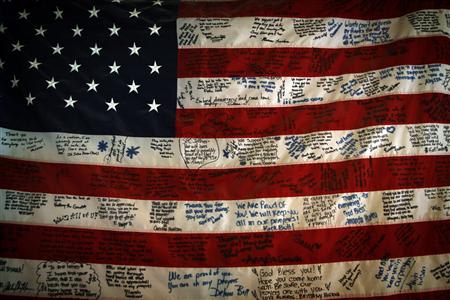
They remembered friends who died and brave Iraqis they had met, but news on Friday that the Iraq war was ending couldn't erase questions among U.S. veterans about whether it has all been worth it.
Sentiment about whether the nearly nine-year war was right or wrong was as divided among veterans as public opinion in general about a conflict that began with the U.S.-led invasion in March 2003 and will end when 40,000 U.S. troops are pulled out by the year-end holidays.
Over its course, about 4,400 U.S. military personnel died and another 32,000 were wounded. Tens of thousands of Iraqis were killed.
While welcome news for families waiting for loved ones to return home, veterans know that it is not an end to foreign deployments, with battles still to fight in Afghanistan.
"For us, it's a personal connection. For most Americans they probably thought the war in Iraq was already over," said Paul Rieckhoff, executive director of the Iraq and Afghanistan Veterans of America.
"It's been a long ride and we've lost a lot of friends and we've had a lot of friends come home wounded and injured, and I think at times like this we always remember the people that we lost," said Rieckhoff, an Army platoon leader in Iraq in 2003-04.
President Barack Obama announced the end of the Iraq war on Friday with surprisingly little fanfare -- no big event, no big signs, no big crowds.
"The last American soldier will cross the border out of Iraq with their heads held high, proud of their success, and knowing that the American people stand united in our support for our troops," he said in the White House press room.
"That is how America's military efforts in Iraq will end."
But U.S. veterans were divided over whether pulling out was the right course of action. Some welcomed it, others felt the job was unfinished.
Daryl Boggs, Jr., a member of the Army Reserve, was injured by an improvised explosive device in Iraq just a month after arriving in March 2003. He suffered shrapnel wounds to his lower body, a fractured leg and a brain injury, and was awarded the Purple Heart for those wounded in action.
"The way I felt from the very beginning was each one of us was there to do a certain job. You feel that what you did was right," he said.
'WAR IS HELL'
Every veteran of the Iraq war will have to decide whether the war was worth the cost, Boggs, who works in Ohio, said. But he would not change the journey he took.
"What happened, happened. War is hell," he said. "I was meant to do a job in this world and I felt I did it. If I was meant to get injured, I was meant to get injured."
Marc Wolfson, 25, of Tampa, Florida, who served two stints in Iraq during his four years in the Marine Corps, said it sounded "more like a retreat than a withdrawal."
The U.S. military still needs to mentor young Iraqis and help rebuild the country, he said. Otherwise, Iraqi anger toward Americans will build and U.S. troops will be forced to return in the future.
"If we pull out like this, it's going to be a total failure," Wolfson said.
"I think that people haven't left with their heads held high for a long time from Iraq," he said. "I pretty much left feeling as though I didn't accomplish anything."
Republican Congressman Mike Coffman still becomes emotional when he remembers an Iraqi worker at a voting station who was wounded in an attack during a national election but refused to be evacuated. He was determined to stay until the polls closed because it took so much courage for Iraqis to come out in that area to vote.
"There were times when I just felt that it would never end. That it was just war without end. We had no traction," said Coffman of Colorado, who served in Iraq with the Marine Corps Reserve in 2005-2006.
But he agreed with Obama's decision. "We're bringing the war to a just conclusion," Coffman said.
Janette Perry, 47, a nurse from Ohio whose son served in Iraq, was visiting the Vietnam War Veteran's Memorial in Washington and said she did not agree with the decision to withdraw troops.
"I understand that there's a price," she said. "You don't withdraw until it's done and it's not done."
"Somebody helped us when we were fighting for our freedom," Perry said. "The Iraqis deserve the same."










0 comments:
Post a Comment